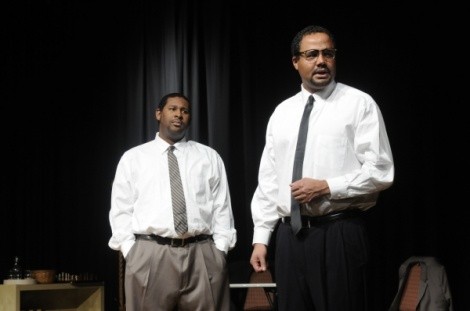
While Martin Luther King Jr. and Malcolm X are the two most recognizable figures of the civil rights movement, they had very different ideas about how to achieve a common goal. The two met briefly once for a photo op, but never got the chance to sit down privately and discuss their similarities and differences. Writer Jeff Stetson has offered a rendition of how the conversation might have unfolded in his 1987 play The Meeting, which features the two leaders verbally sparring in a fictitious summit set in a Harlem hotel room in 1965.
The play is the first production for the EttaGrace Black Theatre Company, recently formed by Toni Byrd and Melissa Adams, two local actresses who used their grandmothers’ names—Etta and Grace—for the company name because, Byrd says, “We want to emphasize that we are living a legacy that we are passing on from generation to generation.”
Adams, who was born and raised in Utah, says, “EttaGrace is about teaching the history of the black community.” With that goal in mind, the two women decided to launch their company with a play about the civil rights movement set on the week surrounding a day celebrating King, in conjunction with the Salt Lake Community College Grand Theatre’s Institute. Bird is producing, while Adams is directing.
Dr. King and Malcolm X have both risen to icon status over the years. Everyone knows the pitch and cadence of King’s “I have a dream” speech, while the legacy of Malcolm X is found in photos and video clips showing a man whose seemingly immovable facial expression embodied his philosophy of “by any means necessary.” Because both were murdered in the 1960s, our collective memory has frozen them in time at the height of their powers.
Actors Terence Johnson (Dr. King) and Lonzo Liggins (Malcolm X) say they view their assignment for The Meeting as finding a way to tear away the iconography and portray both men as mere mortals. “I’ve been telling all my friends and co-workers, ‘This play has no “Dream” speech,’” Johnson says with a laugh.
“Everybody knows his (King’s) public speaking voice, but he was a totally different person when he was with his family and friends. There’s a part of Martin people know. I want to combine that with the part of Martin people don’t know.”
Johnson said the hardest part of researching the role was finding footage of King when he wasn’t giving speeches. The most helpful sources were tapes of news interviews, where instead of soaring rhetoric, Johnson saw a thoughtful Dr. King, “who would pause and take time before answering questions.” The 29-year-old actor—who moved back to Utah a year ago, and just a few months ago was in a production of Twelfth Night—originally auditioned for a smaller role before being asked to read for King, and now says, “I’ll admit, I’ve never played a bigger role.”
Liggins, on the other hand, named his 3-year-old son Malcolm, and says, “Malcolm X was the only role I wanted to read for.” Since getting the nod, Liggins has found, “It’s been way more challenging than any part I’ve ever played. I’ve found there’s a fine line between character and caricature,” that has led to him focusing less on mastering Malcolm X’s speech and mannerisms and more on “playing the role as I see it. I don’t want to do a bad impression of him that will take away from showing who he was and how he interacted with other people.”
The setting of the play itself is helpful to the goals of both actors in that it shows both leaders away from the crowds, cameras and microphones, and instead engaging on a personal level with one another and other characters. The Meeting takes place shortly before the assassination of Malcolm X—and the play takes the commonly accepted view that Malcolm X had a premonition of what lay ahead. Liggins feels his character “sees Martin as a person who is going to live longer than him and be the voice for the black community. Before he goes, he wants Martin to see things his way.”
“It’s kind of like a battle but it’s not battle,” Johnson says of the way the two characters exchange views in the play. “They both want to get to the same place and they say, ‘You do it your way and I’ll do it mine.’ They have the utmost respect for each other, but they question each other’s methods.”
Who makes the better case? Adams says the script is designed to “present both sides and let the viewer decide,” while adding, “I believe both men were necessary for the civil rights movement.”
Whichever side the viewer comes down on, Liggins predicts, “A lot of people will come away with a different perspective of both Malcolm X and Martin Luther King.”
THE MEETING
EttaGrace Black Theatre Company in conjunction with SLCC Grand Theatre’s Institute
Utah Cultural Celebration Center
801-965-5100
Jan. 12 & 15
7:30 p.m.
free
Sorenson Unity Center
801-535-6533
Jan. 17-19
7:30 p.m.
$5-$6